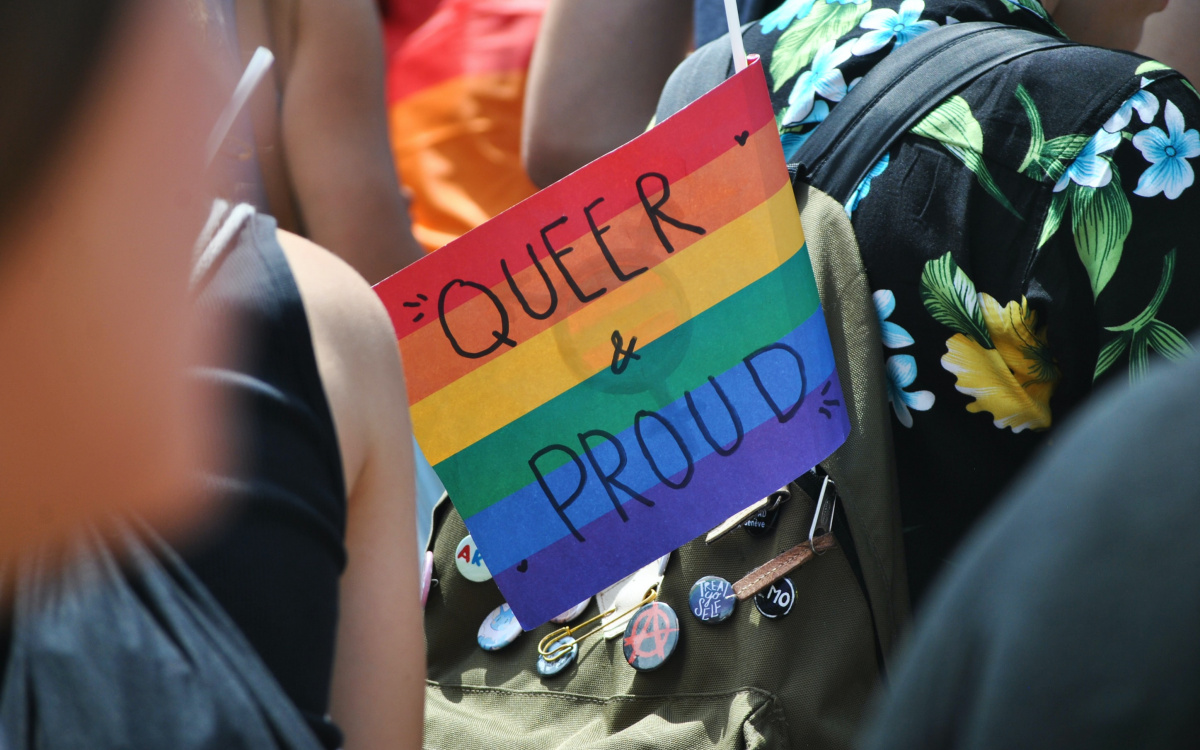
Corporate displays of Pride can be performative and gross, but there is a more authentic way to change. We Catholics should do what we do best: embrace what is difficult, look to tradition to inform our actions, and tell stories that matter about our own people, especially those on our margins.
It’s early morning on a Saturday and boy, am I excited. It’s day fifty-one of quarantine, but today I promised myself a refreshing bike ride across town, and a pain au choc. Like many other Dutch people, I bike to clear my head, and to go places, and so here I am on my way to Niemeijer, God’s definition of a pastry chef.
Amsterdam has been quiet, and if you’ve spent any time here in the last decade, you know why that’s a good thing. Here’s a city held so tightly in the grip of tourism that the best thing to happen to it in recent times is the corona crisis. Don’t get me wrong: a month ago I was standing next to a malfunctioning portable heater in a cold tent outside the hospital waiting for my partner to get a CT scan that would determine if she would have to be admitted to the ICU. This pandemic is a di👏🏽sas👏🏽ter👏🏽. Yet the patch of land that I call home is all the better for it.
Now that there are no humans to marvel at, my eyes wander freely past the city's architecture. All those banners that have been the talk of the town, nay country, are very hard to miss. The Dutch don’t protest hospital staff. We handle our emotions the old-fashioned way: by acknowledging the efforts of those on the front lines during our morning Zoom calls, and by hanging banners from our balconies to thank them for their hard work.
In no time at all, these ‘Proud of health care’ banners have popped up all across the country, and Amsterdam is no exception. Two months ago people living across from hospitals started hanging them, but by now these banners have also taken up half of the ad spaces in the city. Brands are putting on their Sunday best to show the world how proud they are of the people who are keeping us alive. On my way to the bakery I calculate how much money we could have raised collectively if we hadn’t printed all those banners. On my way back, having lost count, I’m just sad. The banner, I think to myself, has become the letter of indulgence of the new decade. Support for health care workers has been commodified.
We queer people know all about commodification. Every year, more and more companies get to display our beautiful pride flag next to their logo, thereby declaring their support for our community. If they’re lucky, it makes us buy more stuff. If they’re luckier, it makes us and everybody else buy more stuff. After all, those who support the queer community deserve to do well for themselves, right? Pride has become a friendly time for brands to say ‘hey, queer people, we saw that you’re actually doing quite well for yourselves. Here’s some stuff we thought you might need.’ I am sad to admit it, but Pride has turned into a branded holiday for performative wokeness.
And that is dangerous.
Since its creation, our pride flag has become a lighthouse of sorts. It draws us in, makes us pay attention, makes us feel safe, makes us listen closely. And once we’re listening, this is what our flag tells us when it’s in the hands of performative wokeness: that brands (whether corporate or political) get to decide which stories about queerness our society gets to see. It assumes that queer pride is valid for those who look like the people in the ads and for those who have purchasing power. It promises that our pride is the same everywhere and for everyone. When the pride flag is the playbill for a performance on wokeness, it tends to give the impression that we’re all the same.
My dear fellow queer Catholics, I am scared that our fabulous flag will be pulled from our hands unless we hold onto it with pride. Many people outside of our community still struggle to understand who, why, and how we are. The branding of Pride undermines what it once stood for. Meanwhile, queer individuals in need of a chosen family cannot find the support they need, at risk of never knowing the power of queer safety and queer belonging.
If we want to reclaim our pride, there are many things we can do. We Catholics should do what we do best: embrace what is difficult, look to tradition to inform our actions, and tell stories that matter about our own people, especially those on our margins. I’m wholeheartedly convinced that persistent, authentic, and homegrown representations of ourselves are the way forward and upward.
Heya, I'm Zinzy
As the newest member of the Vine & Fig leadership team, I am obsessed with our stories. My name is Zinzy Nev Geene, and I’m a designer from Amsterdam who makes resonant queer spaces. I bring to our wonderful community my experience with literature and storytelling, my need for inclusive queer spaces, and my passionate love affair with Catholicism.
My mission is to show the abundance of our queer community, in all its breathtaking colors, so that we may learn about one another, learn about ourselves, and so that Vine & Fig can be a voice in the conversation that’s pushing our Church to better places.
Every Wednesday, I'll be sharing my thoughts on the intersection of queerness, faith, and the rest of life in this new Vine & Fig series called Pray Tell.
Excited to know more about me? Hop on over to Instagram and Twitter to see what's keeping me busy, and check my website for more galore. If you're active in our Slack community, come say hi!